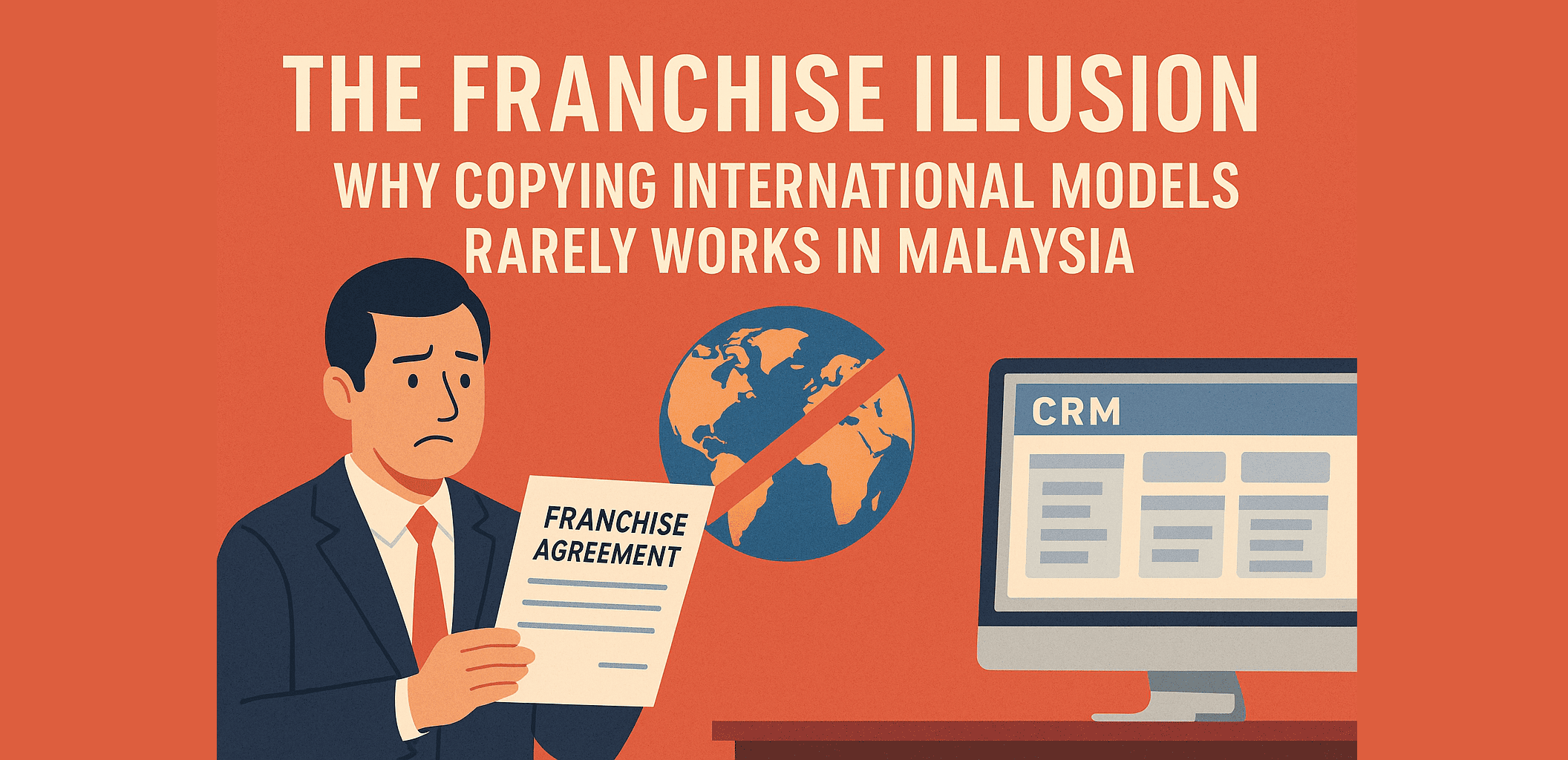The Franchise Illusion: Why Copying International Models Rarely Works in Malaysia

For many Malaysian agency principals, signing an international franchise agreement feels like unlocking a cheat code for success. But that cheat code often comes with a bug that crashes the entire system in the local environment.
Take Amir, an agency boss who paid hefty franchise fees for a “proven” UK system. His agents, however, quickly abandoned the complex CRM—it didn’t integrate with local property portals, couldn’t handle WhatsApp leads, and slowed down their day-to-day work. Amir was stuck paying royalties for a system his team refused to use.
This is the franchise illusion: what looks like a shortcut to growth from the outside often becomes a financial and operational drain on the inside.
The Allure of International Models
International franchises promise:
- Prestige branding – a global name that impresses clients.
- Proven systems – structures already “tested” overseas.
- Recruitment appeal – agents feel they’re joining something bigger.
On paper, it looks like a fast track to scale. But Malaysia’s property market plays by different rules.
Why They Rarely Work in Malaysia
1. Different Legal and Market Structures
In the US or Hong Kong, MLS-style systems, exclusive listings, and consumer protections shape how agencies work. In Malaysia, open listings dominate, illegal agents flood the market, and REA/REN licensing caps apply. Imported playbooks simply don’t fit.
2. Tech Doesn’t Translate
Overseas platforms are built for exclusive, centralized databases. In Malaysia, property work is fragmented and WhatsApp-driven. Imported CRMs often collapse under these conditions—they must be rebuilt from scratch, and few people here have the expertise to do it well.
3. No Pedestrian Traffic Advantage
International brands thrive in dense urban markets with heavy walk-in traffic to shopfronts. In Malaysia, the market is digital and relationship-based. Paying for a foreign logo doesn’t create foot traffic here.
4. Royalty Fees Drain Margins
Franchises don’t just charge a flat annual fee—they take a percentage cut from every deal concluded. That directly eats into the agency’s commission pool. Principals then struggle to offer higher payouts, which are often the key competitive edge in Malaysia’s high-churn market.
The Pain of Listening to the Wrong Voice
One of the most frustrating realities is this: local firms who live and breathe Malaysia end up following instructions from franchisors overseas who don’t understand the ground here.
- They’re told to enforce “international systems” that collapse under open listings.
- They’re required to follow brand rules that add cost but generate no local business.
- They sacrifice flexibility, the very thing that keeps Malaysian agencies alive.
Many bosses eventually realize they’re paying to follow advice that doesn’t work in their own market.
History Proves It
Malaysia has been a graveyard for pure-breed international agency franchises. Almost every brand that tried to copy-and-paste their overseas model here has either died, downsized, or faded into irrelevance.
Why? Because their overseas success was built on assumptions that collapsed here: exclusive inventory, MLS cooperation, career-long agents, and walk-in shopfront traffic. None of these pillars exist in Malaysia.
The only foreign brands that sustain are consultancy-style firms with corporate advisory mandates—an entirely different business model.
Among the rare pure-agency brands that did grow, their survival had nothing to do with the imported playbook. They had to:
- Rebuild everything locally to suit Malaysia’s fragmented, WhatsApp-driven operations.
- Live with the handicap of royalty fees, which reduced their ability to offer top payouts.
- Compensate by building their own ecosystem advantages, such as internal buyer pipelines that made closing deals slightly easier.
They succeeded despite the franchise, not because of it.
What Actually Works in Malaysia
Here’s the antidote to the franchise illusion:
- Localized Systems Instead of Imported Playbooks
Build processes around Malaysian realities: open listings, WhatsApp leads, and high agent churn. Imported systems won’t work here without full rebuilds. - Lean Cost Models Instead of Royalty Fees
Instead of slicing commissions for a franchisor, reinvest in marketing and tech that directly generate leads. This keeps margins intact and allows for competitive agent payouts. - Performance-Based Recruitment Instead of Prestige Branding
Agents don’t stay for logos—they stay when they can close deals. Systems that improve conversion and lead distribution beat foreign prestige every time. - Leadership First, Branding Second
The real differentiator here isn’t a global brand. It’s local principals who understand churn, motivate teams, and adapt to the market.
Self-Assessment for Principals
Before chasing a franchise, ask yourself:
- Can I realistically adapt this system to Malaysia’s open listing market?
- Will revenue-sharing with a franchisor cripple my ability to pay higher commissions?
- Am I buying real tools—or just a logo?
- Why am I listening to someone overseas, when my agents are telling me what works here?
- If history shows most international agency franchises die in Malaysia, what makes me think mine will be different?
Final Word: Don’t Be Fooled by the Illusion
Franchises look glamorous, but glamour doesn’t pay the bills. In Malaysia, sustainable agencies aren’t built on imported logos—they’re built on localized systems, lean cost models, and strong leadership.
The illusion is thinking you can buy success off the shelf. The reality is that pure-breed international agency brands almost always fail here. The rare survivors only succeed by tearing up the foreign playbook and rebuilding everything for Malaysia.











































































































